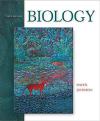 |  Biology, 6/e Author Dr. George B. Johnson,
Washington University
Author Dr. Peter H. Raven,
Missouri Botanical Gardens & Washington University
Contributor Dr. Susan Singer,
Carleton College
Contributor Dr. Jonathan Losos,
Washington University
Behavioral Ecology
Answers to Review Questions|
Chapter 27 (p. 568)
1. Optimal foraging theory states that natural selection favors foraging behavior that maximizes the net energy gained from feeding on a given food item. However, this overall standard may be violated by animals in search of specific nutrients or attempting to avoid being eaten themselves.
2. A territory is an area that is used exclusively by one animal or social group and is actively defended against intrusion by others. Animals are territorial when the benefits of exclusive use of resources in a territory outweigh the costs of defense and risk of injury or predation.
3. Mate choices can be adaptive if individuals in a breeding population differ in the quality of their genes or resources they hold. The advantages of mate choice include selecting parasite-free individuals (a trait that may be heritable) or acquiring food or nest sites needed for reproduction. Parental investment would be the most important quality to look for in mate selection.
4. Monogamy tends to result when offspring require the care of both parents.
5. Reciprocal altruism is when individuals perform an act of altruism in expectation that they will receive similar treatment from others. Altruistic behavior is that which is not in the individual’s self-interest. Kin selection maximizes one’s inclusive fitness if by sacrificing one's self for one’s relatives one's total gene contribution to the next generation increases. Inclusive fitness refers to the total number of one's genes that are passed on to the next generation. Kin selection can lead to altruistic behavior when the individuals in a society are related to one another.
6. An individual who sounds an alarm call is drawing attention, and therefore, usually danger, to him/herself. Females with relative nearby tend to be the squirrels that give alarm calls, thereby protecting a large quantity of genetic material they share with their sisters and their offspring, even if the female herself is attacked.
|
|



 2002 McGraw-Hill Higher Education
2002 McGraw-Hill Higher Education

 2002 McGraw-Hill Higher Education
2002 McGraw-Hill Higher Education